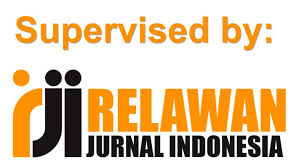Social Media Literacy For The Millennial Generation In The 4.0 Era: Strengthening Religious Moderation
DOI:
https://doi.org/10.37092/el-ghiroh.v23i2.1289Keywords:
Literacy Social Media Religious Moderation Millennial generationAbstract
In today's world, social media platforms such as Facebook, Instagram, YouTube, and TikTok play an important role in conveying messages, both for amusement and information. However, these technical advancements pose moral issues that can be addressed by religious moderation. Religious moderation promotes balance in religious practice while preventing extreme, revolutionary, and fanatical attitudes. The goal of the study is to determine the strengthening of religious moderation values among IAIN Curup students, to understand social media literacy for the millennial generation of IAIN Curup in the 4.0 era as a means of strengthening religious moderation values, and to identify the influencing factors in the strengthening of religious moderation. Descriptive qualitative research methodology. Data was gathered by observation, interviews, and documentation with PAI, TBI, KPI, and BPI study program students, lecturers, and the Head of PAI, TBI, KPI, and BPI Study Programs at IAIN Curup. The study's findings demonstrate that the millennial generation at IAIN Curup uses a variety of social media platforms such as websites, YouTube, Facebook, WhatsApp, and Instagram to reinforce religious moderation principles in the 4.0 era. Internal and environmental influences influence the strength of religious moderation principles. All parties are more maximum in strengthening the values of religious moderation, both during and after the lecture process.
Downloads
References
REFERENCES
Abdiyantoro, Restu, Maria Botifar, and Ifnaldi Ifnaldi. 2023. “OPTIMALISASI PEMBELAJARAN ABAD 21 MELAUI PENANAMAN NILAI-NILAI MODERASI BERAGAMA: SEBUAH KAJIAN PADA PENDIDIKAN AGAMA ISLAM.” PROFETIK: Jurnal Mahasiswa Pendidikan Agama Islam 4(1): 130–39. doi:10.24127/profetik.v4i1.5083.
Arikunto, Suharsimi. 1991. Prosedur Penenlitian Pendekatan Praktek. Jakarta: Rineka CIpta.
Barnsteiner, Jane, Joanne Disch, Michelle Johnson, and Nancy Spector. 2023. “Applying Principles of a Fair and Just Culture to a Student Scenario.” Journal of Nursing Education 62(3): 139–45. doi:10.3928/01484834-20230109-03.
Chaerunnisa, and Mahmudi. 2024. “Moderasi Beragama?: Perspektif Al-Qur’an Dan Hadis.” Reslaj: Religion Education Social Laa Roiba Journal 6(5): 2182–99. doi:10.47467/reslaj.v6i5.1171.
Chettah, Mohamed, Rahima Aissani, and Belqis Chettah. 2022. “The Impact of Information and Communication Technologies on Journalism in the Digital Era A Descriptive and Critical Approach.” In 2022 International Arab Conference on Information Technology (ACIT), IEEE, 1–7. doi:10.1109/ACIT57182.2022.9994114.
Dalimunthe, Syah Ahmad Qudus, and Mailin Mailin. 2023. “Penguatan Moderasi Beragama Melalui Peran KUA Perbaungan Dalam Menjaga Kerukunan Antar Umat Beragama Masyarakat Perbaungan.” Al-Balagh?: Jurnal Komunikasi Islam 7(1): 44. doi:10.37064/ab.jki.v7i1.17025.
Darma Yanti, Annisa, Masduki, Fauzan Azima Syafiuddin, and Syahruddin Siregar. 2024. “Urgensi Guru Dalam Konteks Moderasi Beragama.” Living Islam: Journal of Islamic Discourses 7(1). doi:10.14421/lijid.v7i1.4881.
Fauzi, Reza, Luthfi Yasykur, Mahmud Mahmud, and Mohamad Erihadiana. 2024. “Strengthening the Value of Religious Moderation in the Era of Society 5.0.” EDUTEC?: Journal of Education And Technology 7(3). doi:10.29062/edu.v7i3.679.
Isti’anah, Sheifi Zahrotul, Barizatul Husnah, and Nadlir Nadlir. 2024. “Religious Moderation Through Aqidah And Akhlak Learning In Islamic Elementary School.” AL-WIJDÃN Journal of Islamic Education Studies 9(2): 266–74. doi:10.58788/alwijdn.v9i2.3668.
Januri, Januri, Dwi Putri Melati, and Muhadi Muhadi. 2022. “UPAYA KEPOLISIAN DALAM PENANGGULANGAN KEJAHATAN CYBER TERORGANISIR.” Audi Et AP?: Jurnal Penelitian Hukum 1(02): 94–100. doi:10.24967/jaeap.v1i02.1692.
Porri, Debora, Letteria Anna Morabito, Paola Cavallaro, Elisa La Rosa, Alessandra Li Pomi, Giorgia Pepe, and Malgorzata Wasniewska. 2024. “Time to Act on Childhood Obesity: The Use of Technology.” Frontiers in Pediatrics 12. doi:10.3389/fped.2024.1359484.
Ramadhan, Rizal Furqan, and Didik Setiawan. 2023. “Pelatihan Dan Sosialisasi Digitalisasi Ekonomi Pada Generasi Z Sebagai Upaya Untuk Menghadapi Era Industri 4.0.” PengabdianMu: Jurnal Ilmiah Pengabdian kepada Masyarakat 8(6): 918–24. doi:10.33084/pengabdianmu.v8i6.5506.
Rüther, Lale, Josephine Jahn, and Tamara Marksteiner. 2023. “#influenced! The Impact of Social Media Influencing on Self-Esteem and the Role of Social Comparison and Resilience.” Frontiers in Psychology 14. doi:10.3389/fpsyg.2023.1216195.
Sari, Yunita. 2022. “LITERASI MEDIA DIGITAL PADA REMAJA, DITENGAH PESATNYA PERKEMBANGAN MEDIA SOSIAL.” Jurnal Dinamika Ilmu Komunikasi 8(1): 12–25.
Suparno, Suparno, Dedi Purwana, Agus Wibowo, and Bagus Shandy Narmaditya. 2023. “Industrial Education 4.0: The Role of Human, Technology, and Data Literacy.” Journal of Media Literacy Education 15(3): 27–40. doi:10.23860/JMLE-2023-15-3-3.
Syaifuddin Azwar. 1999. Metode Penelitian. yogyakarta: Pustaka Pelajar
Wijaya, Hengki. 2018. Analisis Data Kualitatif Ilmu Pendidikan Teologi. Bandung
Downloads
Published
How to Cite
Issue
Section
License
Copyright (c) 2025 Rapia Arcanita, Ngadri, Karliana Indrawari

This work is licensed under a Creative Commons Attribution-NonCommercial-ShareAlike 4.0 International License.









